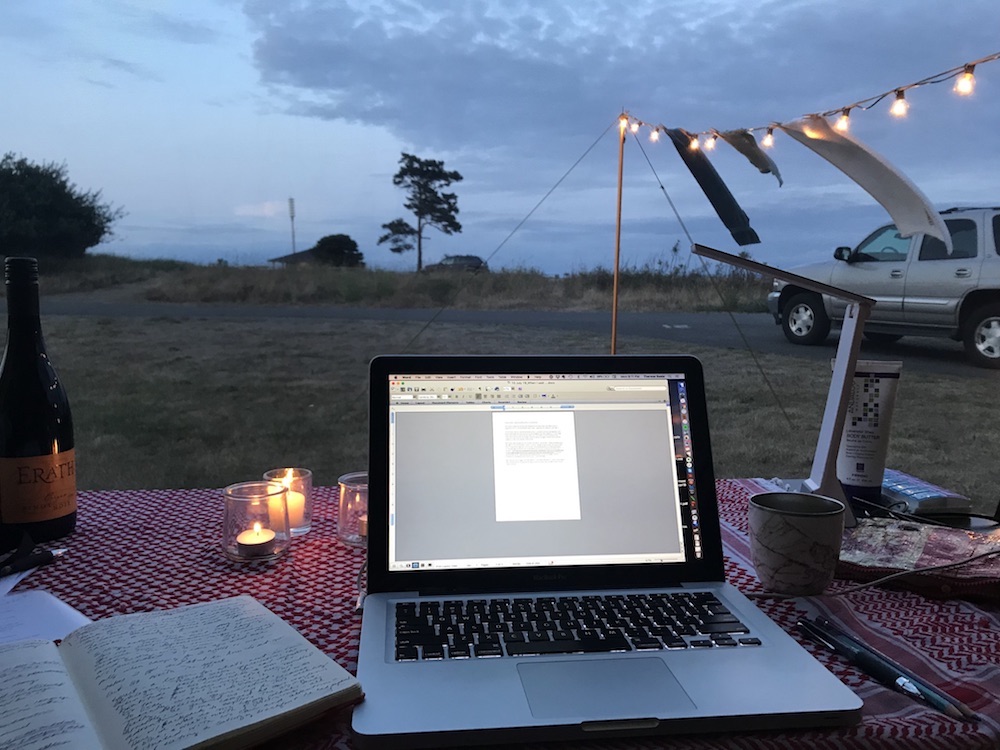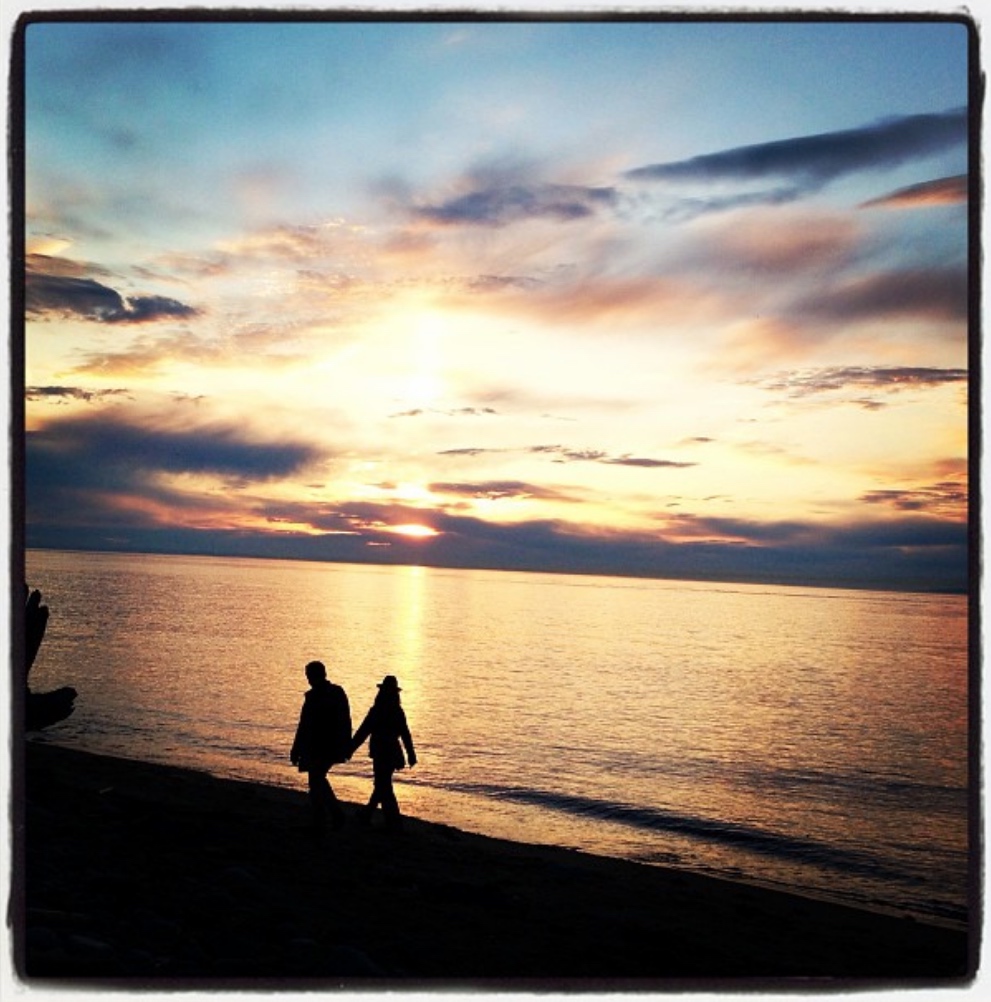Essay by Therese Beale
Inner Life of a Marriage

My husband sat across the picnic table at our campsite in Port Townsend. It was our last meal before we split up for a week in July 2019. I was off to a writer’s conference to write, read, and learn, and he to Olympic National Park to backpack, camp, and explore on his own.
Before me was the plate of scrambled eggs with ham and caramelized red onions, rimmed by chunks of nectarine and banana, that Mark had prepared for our breakfast. Parked next to the table was the electric bike he’d disassembled carefully for me the previous day to fit into our Subaru Outback.
A few feet away stood our massive tent, nicknamed the two-night minimum because it takes two people a full hour to set up. I don’t think of myself as a material person, but I am terribly fond of the tent and the bike. “Oh, you mean the two things your husband found for you?” my friends had teased when I confessed my obsession.
I remember flinching at their words, recalling Mark’s hours of studious research behind the two purchases. He searched YouTube and actually watched a twenty-minute video in Japanese to learn how to set up the tent. He cruised Craigslist and scored the e-bike, an elegant high-tech model with a suspension seat and shock-resistant handlebars, as soon as it was posted at a price we couldn’t resist.
Me, the perpetual benefactor of my husband’s handiwork. I surveyed the glamping scene. “Thanks for feeding me in so many ways,” I said, lingering over those last three words with a sly smile.
“A little something for the effort, if you know what I mean,” Mark cracked.
Mark’s jokes about sex have been a constant in our more than two decades together. I usually brush him off with a laugh, a nod to his Energizer Bunny libido. But this time I felt a stir of indignation toward his lighthearted inference of quid pro quo.
“Oh really? Is this the patriarchal obligation that Steve Almond talked about?” I quipped. A glimmer of hurt crossed his eyes, and I felt a pang of regret.
The day before, we had listened to a video of Almond’s recent lecture in Seattle as we drove to the Olympic Peninsula, the hunk of land that juts out as the Northwestern-most section of the United States. Now I wondered if I had diminished our time together on the meandering drive.
I became a fan of Almond’s when he co-hosted the podcast Dear Sugars with Cheryl Strayed. His maleness served as a rich counterpoint in their offering of advice to the lovelorn. But it was Almond’s lecture on the novel Stoner by John Williams that fascinated me. Almond is a Boston-based writer whose 2014 New York Times essay on Stoner reflected a resurgence of interest in the novel published in 1965. He explored the lessons learned from the relentlessly slow narrative of the protagonist William Stoner, a literature professor whose life passes in obscurity.
My husband is strongly inclined to introspection, a quality that first attracted me to him. I thought a man who understands himself would make the effort to understand me. He did then, and he still does. As for Almond, I sensed Mark would relate to his appreciation of Stoner’s “dogged devotion to the inner life” in our society’s social media-driven epidemic of self-aggrandizement and immediate gratification. In his lecture, Almond spoke of the painful circumstances of Stoner’s wedding night, which ends with the bride retching in the bathroom.
Almond explained that he included this unpleasant scene in his lecture because “I believe our inner lives express ourselves through our bodily actions. But also, because I believe nearly every woman in this room and outside of it has experienced something similar, a moment in which their bodies announce ‘I do not want to have sex’ while their brains conditioned by patriarchal threat are telling them just to get through it.”
I was in the audience that night and felt the air pregnant with reflection, a small inaudible “hmmm” in my throat. As we drove to our camping rendezvous, listening to the YouTube clip of Almond’s lecture in the car, I had laughed at the comment and Mark had slapped my knee playfully. We fidgeted with a truth not usually spoken. And now, here it was again, bubbling up uninvited on this brilliant sunny morning just steps from the beach.
• • •
Mark searched my eyes. I saw his concern, and my heart softened. We were both smiling now. “Of course I expect we’ll want to make love after being apart for a week,” I said. “I just don’t like making it sound like an obligation.”
“Okay, ease up. No expectations,” Mark said. “The effort could be you making a nice dinner for us.”
Me? Making dinner? My feminist self bristled. Was he keeping score and handing me a domestic chore...at a campground? Or perhaps we were dancing awkwardly through the paces of reciprocity. My wiser self knows a perpetual give and take is part of any healthy intimate relationship.
These thoughts flashed as I looked at the man I’d loved for so many years. I knew this was one of those micro-moments in a marriage when it pays to take a breath. To protest would position me as the one inflaming a casual comment—a comment I knew Mark offered to steer the conversation in a different direction.
A little something for the effort, if you know what I mean.
If not for the Almond lecture, I would have heard that comment the way I usually hear it—as a reminder that he appreciates being appreciated. Simple words—“thank you” spoken openly and frequently for even the smallest actions—make a big difference in our marriage.
A few years ago, I was reminded I was doing a lousy job of voicing appreciation when Mark handed me a spreadsheet (he’s an engineer) and asked me to keep a tally. I never used the spreadsheet, but I got the message. I say “thank you” for packing our gear for camping, booking all the ferries, picking up the groceries, listening to my fears, and yes, loading the dishwasher. Mark does the same for me, always has.
For more than 26 years, we’d navigated sexual appetites, split up chores, debated big-ticket purchases, raised two sons. Unpacking the merits of a familiar if tired joke didn’t feel worth the effort. The week stretched ahead, full of promise for reflection and solitude. The sun was shining. We knew we’d be eager to see each other in six days. I decided to let it go.
What I didn’t know at the time is that after nearly a week apart, Mark would end up returning early due to raw weather in the park. He would offer to make dinner that night. I would pitch in without a thought.

Publishing Information
- “Word Works: Steve Almond on Rendering the Interior Life,” video of author lecture at Seattle’s Hugo House on June 18, 2019.
- “You Should Seriously Read ‘Stoner’ Right Now” by Steve Almond, New York Times, May 11, 2014.
Art Information
- “The Write Place” and “All Ends Well” © Therese Beale; used by permission.
Therese Beale is a Seattle-based writer who started her career as a newspaper journalist in her home state of Virginia. She is a graduate of James Madison University and Northwestern University. Outside of her work as a corporate storyteller, Therese enjoys hiking and camping in the Pacific Northwest with family and friends. Her work has appeared in Wraparound South and is forthcoming in Dead Mule.
For more information, follow her on Twitter @tbeale.
